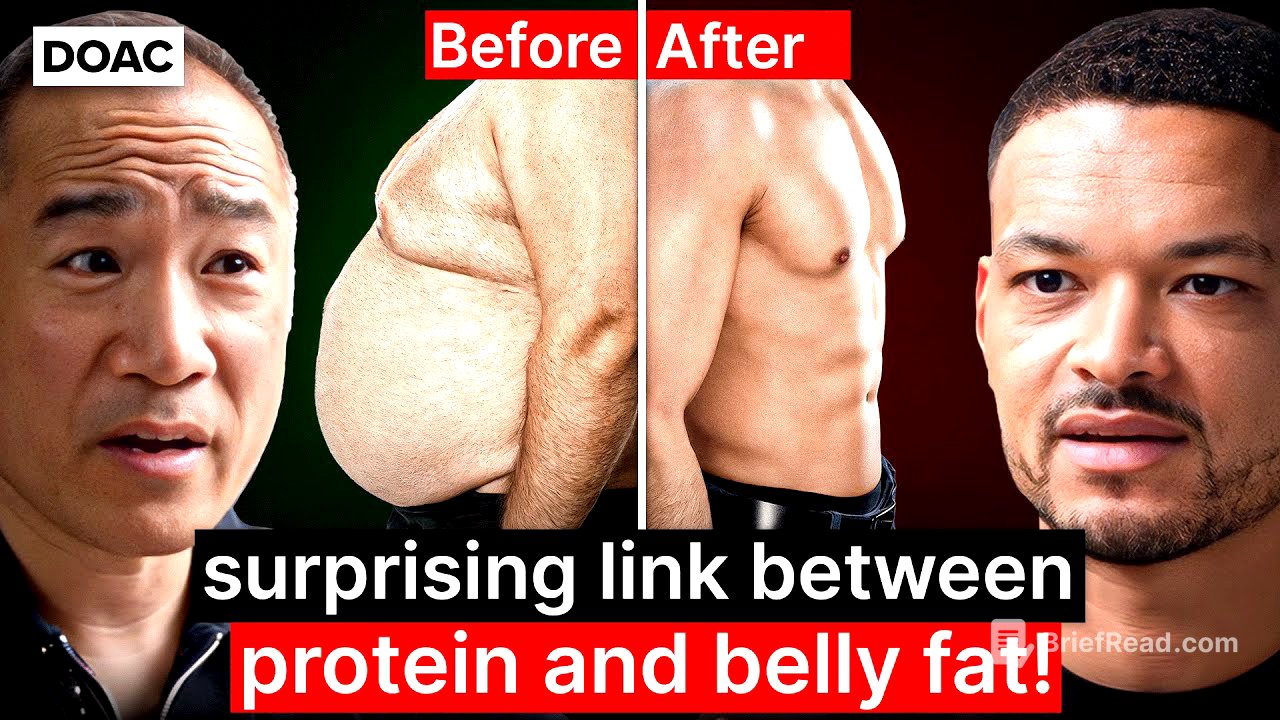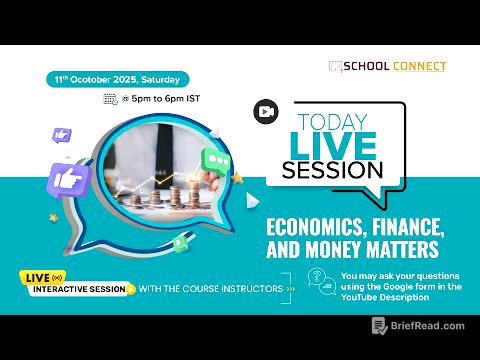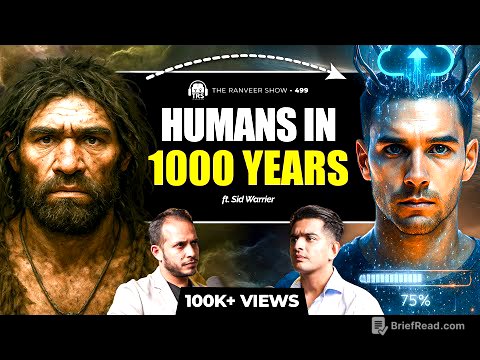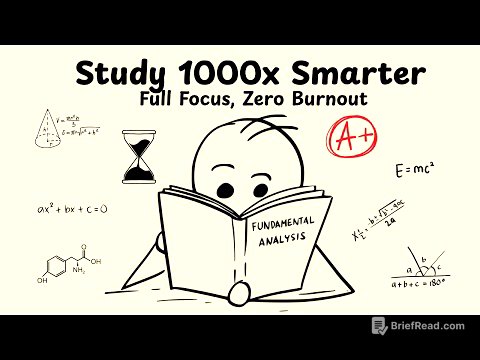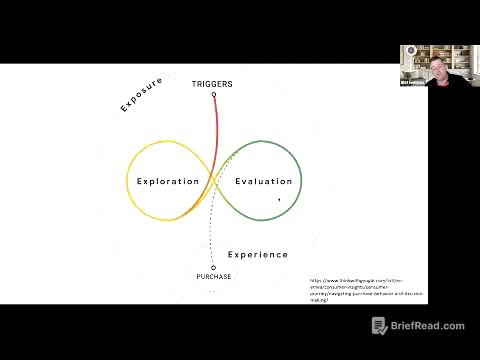TLDR;
Alright, so, this whole chat with Alan Aragon boils down to busting myths and giving solid, science-backed advice on nutrition and fitness. He talks about protein, weight loss, and all sorts of diets, making it clear that what works best is a mix of enough protein, the right amount of calories, and healthy food choices that you can actually stick to. Plus, he touches on how important it is to prioritize your health goals and ditch the excuses.
- Importance of total daily protein intake over timing.
- Sustainable diets are more effective than quick fixes.
- Prioritizing fitness goals is key to success.
Intro [0:00]
The host kicks off by mentioning the audience's top questions about losing fat and gaining muscle. Alan Aragon is introduced as someone who uses science to help athletes perform their best. They're gonna chat about protein, calorie restriction, keto, menopause, fasting, and sugar. The host also shares a personal bit about overcoming alcohol issues.
Why Should the Audience Listen to You? [2:28]
Alan shares his 30+ years of experience, starting with personal training, then nutritional counseling, and finally research and education. He's been part of 30 publications and worked with many people, including high-profile clients like Stone Cold Steve Austin and Derek Fischer. Common goals people have when they reach out are improving body composition, losing fat, and gaining muscle.
The Biggest Myths About Protein [5:15]
Alan debunks the myth that you need to stress about protein timing and distribution. The most important thing is hitting your total daily protein goal. Whether you're a grazer or a gorger, it doesn't matter as long as you get enough protein by the end of the day. The daily total is the cake, and the distribution is just a thin layer of icing.
How Many Meals Should We Eat for Optimal Muscle Gain? [9:39]
Alan explains that the idea of eating five to six meals a day comes from elite bodybuilders who often use enhancements, which isn't really relevant for the general public. For most people, the impact of protein distribution is small compared to the total amount you eat in a day.
How Much Protein Should We Consume Per Day? [11:44]
To figure out how much protein you need, Alan says to consider your training status, your goals, and what's at stake. For someone who's between intermediate and advanced and wants to lose fat and gain muscle, he suggests 1.6 to 2.2 grams per kilogram of target body weight. If you wanna reduce body fat, go for the higher end. For women, start at the low end because they usually have more body fat.
Is There Any Danger in Too Much Protein? [16:26]
Eating too much protein is rarely a problem unless you have chronic kidney disease. For healthy people, high protein intakes aren't a threat to your organs. Animal proteins are generally more anabolic than plant proteins, but once you hit your total daily protein, it doesn't matter as much where it comes from.
How to Lose Weight Fast [21:51]
If you need to lose weight fast, Alan suggests an aggressive calorie deficit, like 20% to 40% below your maintenance needs, while keeping protein high. This will naturally lead to lower carbs and fats. Train regularly, but don't overdo it.
Why Do I Gain Weight After Stopping Ozempic/Ozempic? [23:55]
People often regain weight after stopping GLP-1 drugs because their appetite comes back, and they lack the habits to maintain their weight loss. Alan suggests weaning off the drug while reinforcing good training and dietary habits, and learning to manage hunger.
Does Dieting Affect Metabolism? [25:33]
Metabolism can adapt when you try to gain or lose weight. Overeating can increase non-exercise activity thermogenesis (NEAT), while dieting can decrease it. This is why some people feel like the "calories in, calories out" system doesn't work. Also, adaptive thermo reduction happens when dieting, which means your body stops doing as much.
Best Diet for Long-Term Weight Loss [31:38]
The best diet is one with enough protein and total calories, mostly from healthy food choices, that fits your personal preferences and tolerances.
How Do I Specifically Lose Belly Fat? [32:13]
You can't really target belly fat directly; you have to focus on total body fat loss. But, diets lower in saturated fat might help prevent visceral fat gain.
Why Is Fat Loss Harder During Menopause? [33:29]
Menopause brings physiological and hormonal changes that can make it harder to stick to a fitness program. Hot flashes, joint pain, and poor sleep can all get in the way. Lower your expectations for progress and aim for about half a pound of fat loss per week. Keep protein high, and remember that midlife is often a stressful time.
HRT During Menopause [38:09]
HRT can help those who need it, but it should be decided individually with your doctor. There needs to be a symptom-related reason to start HRT. Also, don't base your decision on a single test; look for trends over time and try lifestyle and diet changes first.
PCOS and Diet Restriction [41:18]
PCOS shares metabolic traits with type 2 diabetes, so be careful with carbs. Prioritize total body fat reduction, and then consider restricting carbs further. About 130 grams of carbs a day seems to be a good spot for controlling blood sugar.
What to Do With Irregular Menstrual Cycles [44:58]
If you have irregular periods, see a doctor first. Then, think about whether you're overtraining and undereating. Don't restrict calories too much if you're trying to fix this.
Muscle Memory [46:31]
Muscle memory is real. When you train, you create new myonuclei, which stay relatively permanent even when you stop training. Plus, you have the motor skills and neurological components that help you regain muscle faster.
Is the Gut Microbiome Affecting My Weight Gain? [47:51]
The gut microbiome plays a role, but it's not the main thing calling the shots. Supplements that claim to fix your gut for weight loss might have a small effect, but it's usually not a big deal. Don't rely on changing your gut microbiome for major body fat changes.
Why Do You Eat So Many Eggs? [49:14]
Alan loves eggs because they're a great source of protein and fat. He eats about four a day and says his health is fine. He sees health guidelines as a starting point but does what works for him and checks his blood regularly.
Testosterone Levels [50:42]
Alan doesn't test his testosterone levels unless he has symptoms of low testosterone. He'd try lifestyle changes first before considering exogenous testosterone.
What Supplements Do You Take? [51:26]
Alan takes a multivitamin, fish oil, magnesium, vitamin D3, vitamin C, collagen, and creatine. If he could only pick three, he'd go with a multivitamin, omega-3s (fish oil), and vitamin D3.
Creatine [53:22]
Creatine is the best non-drug supplement for enhancing resistance training. It helps with strength and size gains, and there's a ton of research backing it up. It also has benefits for joint health, glucose control, and memory.
Diet Breaks [58:35]
Diet breaks are useful for dealing with progress plateaus. A plateau is when you see no change in body composition for four to eight weeks despite sticking to your program. Plateaus are just your body doing its job and achieving homeostasis. Think of them as maintenance practice. Take a week off the diet every four to eight weeks or every five to ten pounds you lose.
How to Get Good at Weight Loss Maintenance [1:02:06]
To maintain weight loss, you have to get there properly, which means keeping your muscle mass while losing fat. Muscle is metabolically active, so losing it hurts your metabolic leverage. Aim to lose about 0.5% to 1% of your body weight per week, do resistance training, and eat enough protein.
Diet Rebounds [1:06:02]
Don't lose weight too quickly, or you'll be more likely to rebound. Every five to ten pounds you lose, take a diet break to ease mental and physical fatigue. When dieting, you'll eventually hit a point where maintenance phases are longer than dieting phases, which is ideal for long-term weight loss.
Fasting [1:11:26]
Fasting can be a good way to control calories and can work as a dieting option. But, Alan pushes back on the idea that it's all about autophagy. Autophagy happens in a calorie deficit whether you're fasting or not. Exercise also increases autophagy. Fasting is great until it isn't, and it's just a tool to help control calories.
Water Fasts [1:19:35]
Alan isn't a fan of water fasts. People often use them to crash off the bad decisions of the holidays. It's better to secure the right habits throughout the year instead of relying on fasts to fix holiday binges.
Keto Diet [1:20:45]
The keto diet is effective for weight loss because it cuts out a lot of processed junk foods and increases protein intake. But, most people can't stick to it long-term. Also, you have to pay attention to the quality of the diet to keep it cardiovascularly healthy.
Gaining Muscle on the Keto Diet [1:26:44]
It's harder to gain muscle on keto, but you still can. Your body can make carbs from within. Studies show that as long as protein and calories are equal, strength gains can be similar to a high-carb diet. But, high-carb diets usually lead to more muscle size gains.
Carnivore Diet [1:28:55]
The carnivore diet is a bit extreme, but it has some merit. It's better than the standard Western diet because you automatically eat fewer calories. You can optimize it by having more variety, like fatty fish, poultry, beef, eggs, and dairy.
Do Vegans and Vegetarians Struggle to Gain Muscle? [1:31:11]
Vegans and vegetarians often struggle to gain muscle because they don't eat enough total calories and protein. But, they can gain muscle just as well as omnivores if they structure their diet right.
Do Most People Get Enough Protein? [1:31:58]
Most people who are overweight or have body fat issues don't eat enough protein. Even skinny people who can't gain weight might not be eating enough.
What’s Stopping People From Reaching Their Body Goals? [1:36:46]
People often struggle because they don't prioritize their physical goals. You have to make it a top priority and ditch the excuses. Figure out why you're doing this and what the barriers are.
Your Alcohol Addiction [1:41:57]
Alan shares his personal story of alcohol addiction, which started around age 40 due to stress. He was drinking a bottle and a half of wine a night. He realized he needed to stop when his personal and professional life imploded. He made a commitment to stop and redirected his tendencies toward training and good nutrition.
Artificial Sweeteners [1:50:16]
Artificial sweeteners are generally safe, but saccharine has a bad track record for glucose control and weight gain. Luckily, it's not very common. Other sweeteners like sucralose, aspartame, and stevia are all fair game.
The Lies We've Been Told About Sugar [1:52:02]
People often vilify sugar, but it's important to distinguish between added sugars and naturally occurring sugars in foods like fruit. Fruit has sugar, but it also has a ton of other beneficial components. It improves glycemic control, body weight, and protection against diseases.
Refined Sugar [1:55:45]
Added sugar is a problem because it dilutes the nutrient density of the diet and is often packaged with processed carbs and fats. Limit added sugar to about 10% of your total calories.
How Often Should We Go to the Gym Each Week? [1:58:15]
Alan goes to the gym four to five days a week. It's better to spread out your sets over multiple days rather than cramming them into a single session.
How Long Does It Take to Lose Muscle? [1:58:53]
Muscle loss happens quickly in bedridden people. If you take a week or two off with active rest, you probably won't notice much change. After three weeks, you'll definitely feel it.
How Does Nature Impact Your Life? [2:02:06]
Being in nature has psychological benefits. Marine communities tend to live longer, possibly due to omega-3s and the metaphysical effect of being by the ocean.
Where Can People Find You? [2:03:46]
You can find Alan at alanaragon.com and on Instagram @thealanaragon. His book, published in 2022, is like a bible of nutrition and fitness.
